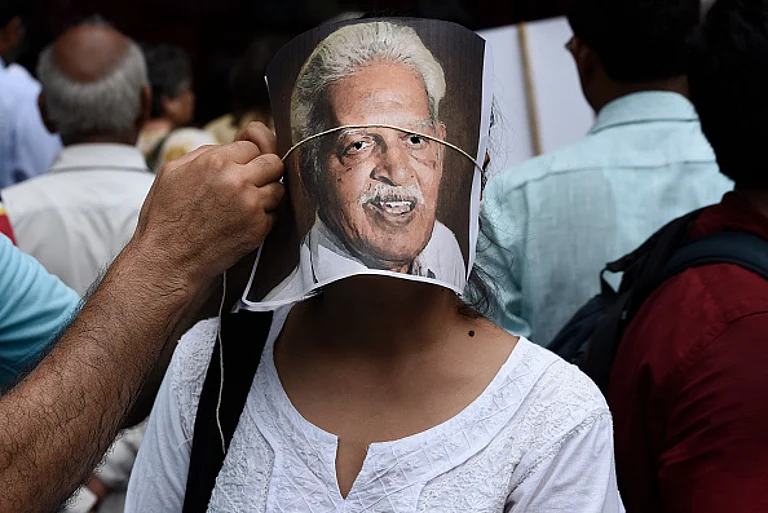Arundhati Roy is in the crosshairs of the government, again. On Friday last, Delhi Lt Governor VK Saxena gave sanction to prosecute the award-winning author and academic Sheikh Showkat Hussain under the Unlawful Activities (Prevention) Act (UAPA.) The sanction is on a 13-year-old complaint against Roy and others for remarks made during an event in Kashmir, Azadi: The only way.
From Critiquing Nuclear Policy To Refusing National Award: Arundhati Roy's Many Run-Ins With The Government
Arundhati Roy's scathing critique on issues ranging from development projects to India's nuclear policy has often caused her to feel not only the ruling party's wrath but also the Opposition's
This is not Roy's first run-in with the law. Her scathing critique on issues ranging from development projects to India's nuclear policy has often caused her to feel not only the ruling party's wrath but also the Opposition's. Outlook looks at the timeline of Arundhati Roy's trials with the Indian government.
A day in jail
In 2002, a three-judge SC bench allowed contempt proceedings against Roy for her article in Outlook magazine decrying court’s decision regarding Sardar Sarovar Dam, Gujarat's leading development project. Though SC later said that it was not impressed by the evidence against Roy, it nonetheless took issue to the language in her reply affidavit and thus convicted her of contempt of court. Roy spent one day in jail and paid a fine of Rs 2500.
Refusing national awards
In 2005, Roy refused the prestigious Sahitya Akademi literary award for her book of political essays The Algebra of Infinite Justice. While issuing her refusal, Roy said she had the utmost respect for the Award and its judges. However, said she could not accept the award due to disagreements with the government’s economic and military policies.
Nuclear policy
In 2006, two months after the Pokhran nuclear tests, Roy published a scathing critique of the policy in her book The End of Imagination. The book received heavy criticism from writers, government and academics.
Sign of the times
Two years later, Roy found herself at the receiving end of ire from both government and opposition. In an interview with TOI, Roy spoke of a rally she attended in Kashmir, where she said signs called for secession from India. Her remarks in the interview drew the ire of both Congress and BJP, with the Congress (ruling at that time) demanded she withdraw her statements.
Prosecution under UAPA
After bitter fighting in Kashmir between the army and citizens, Roy remarks at a 2010 convention called 'Azadi: The Only Way' that “Kashmir is not an integral part of India.” A sedition complaint was filed against her and two men (deceased).
It is on this complaint that LG has granted sanction to prosecute her and others under UAPA in 2024.

